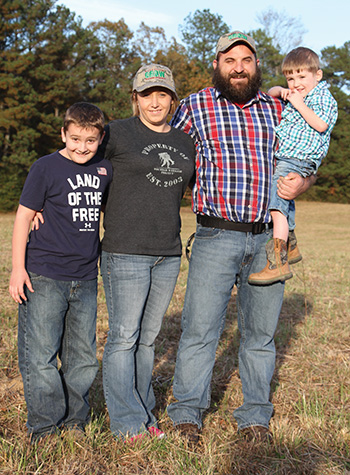The Journey From Battlefield To Produce Field

The passionate twinkle in Gregg DeBoer’s eyes seemed to thaw the crisp Cullman County air as he described his journey from Army combat engineer to part-time farmer.
DeBoer, 36, went to boot camp 10 days after graduating high school, served tours in Kosovo and Iraq and later served as a recruiter during his 11 years in the Army. But when he came home in 2009, the U.S. economy was treading water and civilian life looked daunting.
“I probably put in 75 resumes and never got a call,” he said.
Eventually, DeBoer started an entry-level position at a metal supply company. Within two months he became a supervisor, and eventually moved to his current position as an automotive supplier supervisor. But then life seemed to drop another bombshell.
“My appendix burst,” he said. “They did emergency surgery to remove it, and I was given Oxycontin. I took it, and it was like the weight of the world was off my chest, which is exactly why I stopped taking it.”
DeBoer, in true warrior spirit, refused to take the pills and instead took his health into his own hands after waiting in the Department of Veterans Affairs slow lane.
“I had to figure out how to make myself right,” he said through his thick, bushy beard. “Through social media, I saw a lot of veterans were getting better through agriculture and farming. Animals don’t care if you have tattoos or had a bad day.”
Serendipitously, Limestone County Extension Coordinator Chris Becker heard the same thing around the same time.
“Last July, we had our national Extension meeting in Mobile,” Becker said. “We had some extra space, and I thought it would be cool to give a booth to the Wounded Warrior Project. They said they had a lot of vets interested in small-scale agriculture, but didn’t know how to get into it.”
Becker filled that need by obtaining a $7,000 Northwest Alabama Research Conservation & Development grant, called Operation Grow, to introduce veterans to small-scale agriculture.
DeBoer, whose work schedule interfered with class times, tackled program material without attending a class and, along the way, expanded a raised bed to most of his backyard growing 12 different vegetables. DeBoer now has a consistent buyer for peppers and sells the rest of his produce at farmers markets with his wife, Liz, and two sons, Max, 3, and Oliver, 9. He recently signed a six-acre lease where he plans to add livestock to the mix.
While the program isn’t designed to churn out agronomists, the value of Operation Grow, both DeBoer and Becker said, is it scratches an itch.
“Gregg never attended a class, but he’s a success story,” Becker said. “We gave him some info, and he devoured it. But if you realize this isn’t what you want to do, then I consider that a success story, too.”
Luckily, Becker and Extension have the chance to create more success stories with part of a $711,213 U.S. Department of Agriculture Beginning Farmer and Rancher Development Program grant.
“In the coming months we’re going to plan two Operation Grow programs — one in Birmingham and one around Mobile,” Becker said. “The following year we’ll be in Huntsville and Montgomery so we’ll cover all areas of the state. There’s still a lot of planning and decisions to be made.”
DeBoer, meanwhile, serves as a testament to the program by keeping his boots on the ground and his mind on the mission.
“I eventually want to hire some veterans and expose them to agriculture and the therapy it’s given me,” he said. “I’d like to get a stand-alone building, find a homeless vet or two, and provide them with a place to live, work and help put money in their pockets. I want to give them a hand up and not a hand out; maybe that’s what they need.”
Interested veterans may contact Becker at cmb0034@aces.edu or (256) 232-5510. Contact DeBoer at greggory.deboer@gmail.com.
